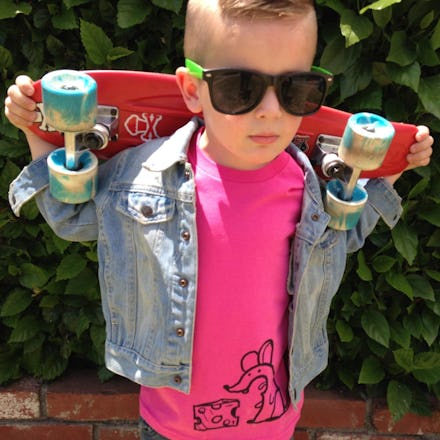How One Seattle Mother Is Taking Down Gender Stereotypes

We're making solid progress to reverse the highly gendered societal rules that dictate what toys children should play with and what clothes they should wear. But the bias against men and boys who choose to wear pink has never really gone away.
While macho stereotypes abound for both adult men and teens, the insidious messaging takes shape early, in the formative years when marketers solidify color-coding: blue for boys, pink for girls.
But it doesn't have to be that way, and teaching kids from an early age is a smart and simple way of spreading the message. A Seattle mom with two sons is doing just that with her new #freetowearpink campaign.

Martine Zoer's Kickstarter received close to $2,700 in donations for her Quirkie Kids shirts, helping launch the brand. The idea behind the clothing line is simple: Self-expression should not be limited by societal pressures. (The line also addresses other gendered stereotypes, like the myth that girls don't like science.)
"Some boys like pink, and why not? Pink is just a color, and so is green, and blue, and yellow. No child should be teased for what they wear," she wrote on her Facebook page.
Marketing of gender-conforming colors and toys, like blue and pink aisles in kids' stores or the gender-specific doll and action hero options in fast food meals, can seem inescapable. But the positive response to Zoer's campaign on social media suggests change is coming — or at the very least, that parents are becoming more aware of the issue.
How fun is this picture by @PotatoFeetLA I am so grateful that I get to experience childhood again through my boys! pic.twitter.com/H89Sl7IoNf
Zoer's company follows in the footsteps of many like-minded efforts, including South Korean visual artist JeongMee Yoon's vibrant Pink and Blue Projects, which explore color preferences of children and their parents across different cultures. The artist found that the pink stereotype was almost universal, but he also noted that gender identities have no real historic precedent, but were created by modern marketers, much the way razor companies have made body hair taboo.
Pinkstinks, a campaign started by U.K.-based sisters Abi and Emma Moore, has worked to change the way marketers target children, specifcially the way they push makeup as toys. The sisters even forced London toy store Hamleys to stop labelling its floors in blue for boys and pink for girls and arranging toys by gender stereotypes.
Change isn't always easy to see, but lucky for us, this kind comes in all kinds of wonderful colors.